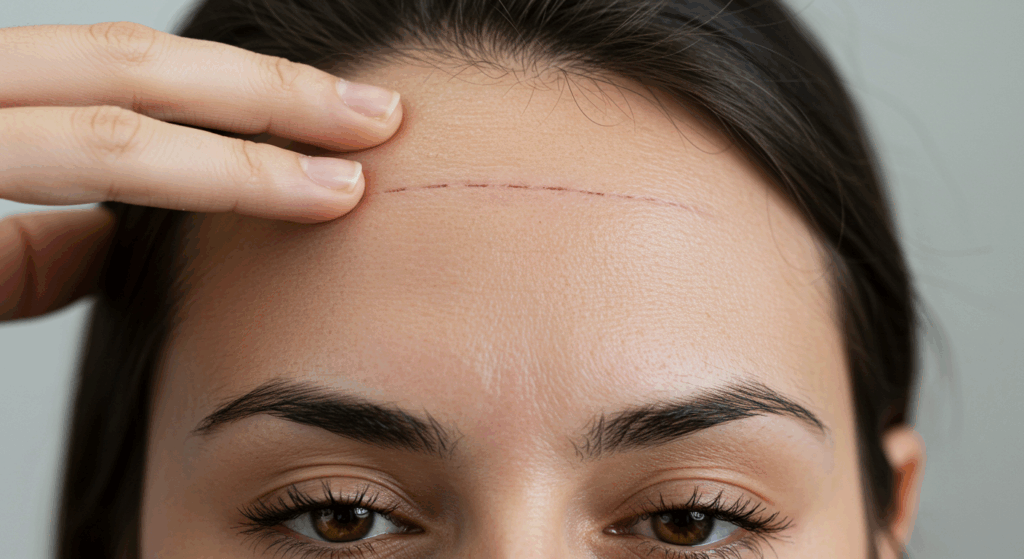يخضع ل تاجي شق إجراء is a significant step, whether for medical or cosmetic reasons. Proper pre-operative تحضير is crucial for ensuring a smooth جراحة والمثالي استعادة. هذا مرشد provides a comprehensive, step-by-step breakdown of everything you need to know before your procedure, from medical evaluations to lifestyle adjustments.
By following these guidelines, you’ll minimize المخاطر, enhance recovery, and achieve the best possible outcome. Let’s dive into the essential preparations you need to make.

جدول المحتويات
1. التقييمات والاستشارات الطبية
1.1. التقييم الطبي قبل الجراحة
Before your عملية شق الإكليل, your surgeon will conduct a thorough medical assessment to ensure you’re a suitable candidate. This typically includes:
- تحاليل الدم: للتحقق من وجود عدوى أو فقر الدم أو اضطرابات التخثر.
- تخطيط القلب الكهربائي (ECG): لتقييم صحة القلب، وخاصة للمرضى الذين تزيد أعمارهم عن 40 عامًا أو لديهم تاريخ من أمراض القلب.
- Chest X-Ray: لتقييم صحة الرئة واستبعاد مشاكل الجهاز التنفسي.
- اختبار الحساسية: To identify potential allergic reactions to التخدير or medications.
1.2. استشارة الجراح
أثناء استشارتك، سيقوم الجراح الخاص بك بما يلي:
- ناقش تاريخك الطبي، بما في ذلك العمليات الجراحية السابقة، والحالات المزمنة، والأدوية.
- اشرح الإجراء بالتفصيل، بما في ذلك المخاطر والفوائد والنتائج المتوقعة.
- توفير تعليمات ما قبل الجراحة المصممة خصيصًا لتلبية احتياجاتك المحددة.
For more insights on preparing for جراحة, check out our guide on كيفية الاستعداد لعملية التجميل.
2. تعديلات نمط الحياة قبل الجراحة
2.1. النظام الغذائي والتغذية
Your diet plays a critical role in preparing your جسم for surgery. Focus on:
- الترطيب: اشرب ما لا يقل عن 8 أكواب من الماء يوميًا للبقاء رطبًا.
- نظام غذائي متوازن: Consume a diet rich in proteins, vitamins, and minerals to support شفاء. Include lean meats, fruits, vegetables, and whole grains.
- تجنب الكحول والكافيين: كلاهما يمكن أن يسبب الجفاف ويتداخل مع التخدير.
2.2. التدخين والنيكوتين
Smoking and nicotine use can impair healing and increase the risk of المضاعفات. It’s essential to:
- الإقلاع عن التدخين لمدة 4 أسابيع على الأقل قبل الجراحة.
- تجنب لصقات النيكوتين، أو العلكة، أو منتجات التدخين الإلكتروني.
2.3. التمارين الرياضية والنشاط البدني
مع أهمية الحفاظ على النشاط البدني، تجنب التمارين الشاقة في الأسبوع الذي يسبق الجراحة. ركز على الأنشطة الخفيفة كالمشي للحفاظ على الدورة الدموية.
3. إدارة الأدوية
3.1. الأدوية التي يجب تجنبها
قد تزيد بعض الأدوية من النزيف أو تتداخل مع التخدير. قد ينصحك جراحك بتجنب:
| نوع الدواء | أمثلة | متى تتوقف |
|---|---|---|
| مميعات الدم | الأسبرين، الوارفارين، الإيبوبروفين | قبل أسبوعين من الجراحة |
| المكملات العشبية | الجنكة بيلوبا، الثوم، الجينسنغ | قبل أسبوعين من الجراحة |
| فيتامين هـ | المكملات الغذائية عالية الجرعة | قبل أسبوعين من الجراحة |
3.2. الأدوية المعتمدة
Your surgeon may prescribe or approve certain medications to manage ألم or prevent infections post-surgery. Always follow their instructions regarding:
- المضادات الحيوية للوقاية من العدوى.
- مسكنات الألم لراحة ما بعد الجراحة.
4. اللوجستيات والتخطيط
4.1. ترتيب النقل
You won’t be able to drive immediately after surgery. Arrange for a friend or family member to drive you بيت post-procedure.
4.2. جهّز مساحة التعافي الخاصة بك
قم بإعداد منطقة مريحة للتعافي في المنزل مع:
- وسائد للحفاظ على رأسك مرتفعًا.
- Ice packs to reduce تورم.
- وجبات ووجبات خفيفة سهلة التحضير.
- الترفيه مثل الكتب أو الأفلام أو الموسيقى.
4.3. خطة الرعاية بعد الجراحة
تأكد من وجود شخص يساعدك خلال أول ٢٤-٤٨ ساعة بعد الجراحة. يمكنه مساعدتك في:
- إعطاء الأدوية.
- إعداد وجبات الطعام.
- المساعدة في التنقل.
لمزيد من النصائح حول التعافي، اقرأ مقالتنا حول نصائح للتعافي السلس بعد الجراحة.
5. التحضير العقلي والعاطفي
قد يكون الخضوع لعملية جراحية أمرًا صعبًا عاطفيًا. إليك كيفية الاستعداد نفسيًا:
- ثقف نفسك: تعرف على الإجراء وعملية التعافي والنتائج المتوقعة لتقليل القلق.
- حدد توقعات واقعية: Understand that recovery takes time and نتائج may not be immediate.
- Practice Relaxation Techniques: يمكن أن يساعد التأمل، أو التنفس العميق، أو اليوجا في إدارة التوتر.
6. فهم المخاطر والمضاعفات
كل إجراء جراحي ينطوي على مخاطر. بالنسبة لعملية شق الشريان التاجي، تشمل المضاعفات المحتملة ما يلي:
- العدوى في موقع الشق.
- نزيف أو ورم دموي.
- تلف الأعصاب مما يؤدي إلى الخدر أو الضعف.
- Scarring or شعر loss along the incision line.
لمعرفة المزيد عن المخاطر، قم بزيارة مقالتنا حول رفع الحاجب بالمنظار مقابل رفع الحاجب التاجي: الإيجابيات والسلبيات.
7. قائمة التحقق قبل الجراحة
استخدم قائمة المراجعة هذه للتأكد من استعدادك الكامل لإجراء شق الشريان التاجي:
| مهمة | مكتمل |
|---|---|
| إكمال جميع الفحوصات الطبية قبل الجراحة | |
| استشر جراحك وأجب على جميع أسئلتك | |
| - تعديل النظام الغذائي وتجنب الكحول والكافيين والتدخين | |
| توقف عن تناول مميعات الدم والمكملات العشبية | |
| ترتيب النقل والرعاية بعد العملية الجراحية | |
| جهّز مساحة التعافي الخاصة بك في المنزل | |
| مارس تقنيات الاسترخاء لإدارة التوتر |

الخاتمة: طريقك إلى إجراء ناجح
النقاط الرئيسية
- إن التحضير الجيد قبل الجراحة أمر ضروري لتقليل المخاطر وضمان التعافي السلس.
- اتبع تعليمات الجراح فيما يتعلق بالتقييمات الطبية وتعديلات نمط الحياة وإدارة الأدوية.
- قم بالتخطيط لرعاية ما بعد الجراحة وقم بإعداد مساحة التعافي الخاصة بك مسبقًا.
- فهم المخاطر والمضاعفات المحتملة المرتبطة بإجراء شق التاجي.
الخطوات التالية
الآن بعد أن أصبحت مجهزًا بهذا الدليل الشامل، اتبع الخطوات التالية:
- جدولة التقييمات الطبية الخاصة بك قبل الجراحة.
- استشر جراحك للإجابة على أي أسئلة متبقية.
- ابدأ بإجراء تعديلات على نمط حياتك لتحضير جسمك للجراحة.
- ترتيب الخدمات اللوجستية مثل النقل والرعاية بعد العملية الجراحية.
الأسئلة الشائعة
1. كم من الوقت يستغرق التعافي من عملية شق الشريان التاجي؟
تختلف مدة التعافي، لكن معظم المرضى يستطيعون العودة إلى أنشطتهم الطبيعية خلال أسبوعين إلى أربعة أسابيع. قد يستغرق التعافي الكامل عدة أشهر.
2. هل سيكون لدي ندبات مرئية بعد العملية؟
The coronal incision is typically made along the خط الشعر, which helps conceal scars. However, some scarring may be visible initially but usually fades over time.
3. هل يمكنني غسل شعري بعد العملية الجراحية؟
يجب عليكِ تجنب غسل شعركِ لمدة 48 ساعة على الأقل بعد الجراحة. سيقدم لكِ الجرّاح تعليماتٍ مُحددة حول الوقت الآمن لاستئناف غسل الشعر.
4. ماذا يجب أن أرتدي في يوم الجراحة؟
ارتدِ ملابس فضفاضة ومريحة لا تحتاج إلى شدها فوق رأسك. تجنب المجوهرات أو المكياج أو العدسات اللاصقة.
5. كيف يمكنني إدارة الألم بعد العملية؟
سيصف لك الجرّاح مسكنات للألم لتخفيف الانزعاج. كما أن وضع كمادات الثلج على منطقة الجرح قد يساعد في تقليل التورم والألم.
6. هل هناك أي قيود غذائية بعد الجراحة؟
تناول أطعمة طرية وسهلة الهضم خلال الأيام الأولى. تجنب الأطعمة الحارة أو المقرمشة أو صعبة المضغ التي قد تُرهق منطقة الجرح.
7. متى يمكنني العودة إلى العمل؟
يمكن لمعظم المرضى العودة إلى العمل خلال أسبوعين إلى ثلاثة أسابيع، حسب طبيعة عملهم. تجنب الأنشطة الشاقة لمدة لا تقل عن أربعة إلى ستة أسابيع.
8. ما هي علامات العدوى بعد الجراحة؟
انتبه لأعراض مثل زيادة الألم، أو الاحمرار، أو التورم، أو خروج إفرازات من موضع الشق. قد تشير الحمى أو القشعريرة أيضًا إلى وجود عدوى. اتصل بجراحك فورًا إذا لاحظت أيًا من هذه الأعراض.
يزور ملف Dr.MFO Instagram لرؤية تحولات المريض الحقيقية! احصل على لمحة من النتائج المذهلة التي تم تحقيقها من خلال علاج الوجه جراحة التأنيث وأخرى إجراءات. يعرض الملف الشخصي صورًا قبل وبعد صور هذا هو أبرز ما في الأمر الدكتور MFOخبرة ورؤية فنية في خلق نتائج جميلة ذات مظهر طبيعي.
هل أنت مستعد لاتخاذ الخطوة التالية في رحلتك؟ الجدول الزمني أ استشارة مجانية مع الدكتور MFO ( أفضل جراح تجميل الوجه من أجلك) اليوم. أثناء الاستشارة، يمكنك مناقشة أهدافك، وطرح أي أسئلة قد تكون لديك، ومعرفة المزيد حول كيفية الدكتور MFO يمكن أن تساعدك على تحقيق المظهر المطلوب. لا تتردد في الاستفادة من هذه الفرصة المجانية لاستكشاف الخيارات المتاحة أمامك ومعرفة ما إذا كان الدكتور MFO هو المناسب لك.








